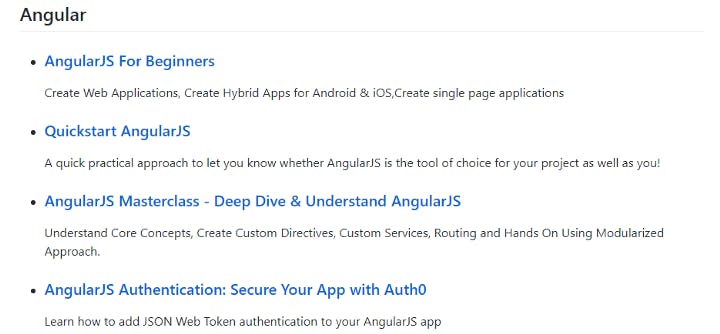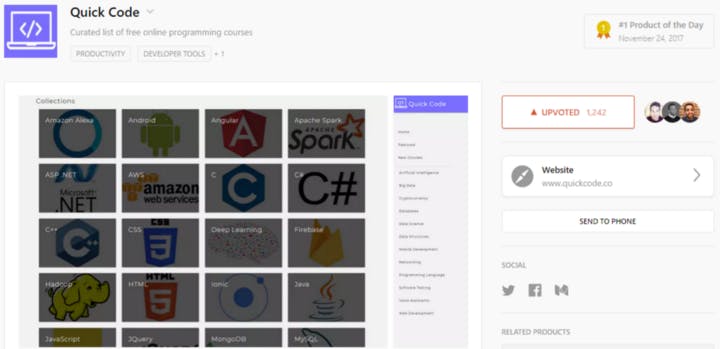Subscribe
Sign in
Share On
How trying to learn a new skill turned into launching a new product used by millions
It was mid-September 2017.
I was planning to learn a new framework to improve my web development skills. I had the previous background of programming with Java, so I decided to learn Java’s Spring Framework for deeper knowledge in web development. I started to look for online courses that can teach me fundamentals of Spring framework. Instead of text-based tutorials, my focus was on an online course because they are easy to follow and learn. I visited several online education providers and different MOOCs for Spring related courses. I read each course’s overview, topics covered, detailed reviews and finally decided on a course to start with.
The whole process took hours.
During this process, I observed a few things:
Most of the time I spent was on finding the right course instead of starting to learn sooner. There are numerous free online courses available on several platforms to learn any programming languages and framework of one’s choice. There was no central place to discover courses related to programming frameworks.
I could clearly see a problem that people might be wasting more time in finding the right course instead of spending that time on learning. I created a central repository of all these courses and tagged them based on programming language, framework type and development type. Next, I uploaded on Github and posted on Reddit. In a few hours, it was on the top of the subreddit, and some tech blogs also published about it.


The response on Reddit validated the need for a central place to discover free online programming courses. By this time, I was also done with my own Spring framework course, and I was quite confident that I could build some web application of my own using the Spring framework. Quick Code was born.
So I started designing a prototype for the site. It involved many hours in deciding on different features and prioritizing which ones to build first. The idea was to create a simple solution so anyone can find the free course of their choice in a few clicks.
After deciding and prioritizing on features, it was time to build the actual product. First thing was to decide the overall architecture of the site and which technological stack to use.
I decided :
- Spring framework for the backend
- Materialize CSS for the frontend
- Heroku as the deployment server
- PostgreSQL as a database
Luckily, I found an easy to integrate GitHub with Heroku. It was fast to deploy the code changes on a server with Heroku, so that was an easy pick. Finally, I started writing code, implemented backend, designed the frontend and ended up spending a few weekends in getting the site up.
In three weeks, the site was live with 200 free courses across 40 programming languages and frameworks. The courses were categorized in many categories, including web development, mobile development, software testing, programming languages, artificial intelligence, among others. They were also tagged by different subjects including Android, Angular Js, Java, JavaScript, Python, React Js, Vue Js, Kotlin and Swift.
I posted QuickCode on Product Hunt during Thanksgiving weekend. It ended up being #1 product on Product Hunt with 1.1K upvotes.

The traffic was insane! Over 10,000 people visited the site in just three days after the launch. This was just the beginning. Over time, I kept improving the site. I started by adding free courses from different sources and introduced new features. Some of them are:
- Bookmark a course
- Manage the progress of the courses
- Create courses collection
- Connect with other learners learning similar things
All this while, more than one million people visited QuickCode to find free courses to learn different programming languages and frameworks. As it started to grow, I felt the need to connect with friend and freelancers, and together we collected more than 3,000 free courses related to programming, upcoming technologies, certifications and even some new or very niche courses.
At last count, QuickCode has free courses spread across 80 different programming languages and frameworks. When I look back, it is heartening to see how a simple side project, starting as a GitHub repository, evolved over the year.
This last weekend, as usual, I was thinking about what next to do on QuickCode and I was going over what aspects of the site our community uses most. It then struck to me, looking into the Google Analytics dashboard, that more than 100,000 people have visited Quickcode to discover free online programming courses. That means, I ended up touching lives of 100K people when they thought of learning a new technology, start a career in software programming, or simply to learn a new skill.
Comments (3)
Keyul@keyul
Quick Code
Thank you Product Hunt for publishing story on Quick Code journey
Share
An attempt to learn a new skill can turn into an incredible success, but learning a new skill can be tough. There are a lot of reasons why people fail at learning new skills. There can be a lot of pressure to perform at all times, and if you’re not getting something out of it so you have to get resumesplanet help to manage your university tasks easily, you’re not going to stick with it. The best way to learn a new skill is to find a hobby that you enjoy and get to know it well. You’ll have a lot more fun in doing this and will likely be able to take your skills to the
I am a co-founder of Code Year, an organization whose mission is to bring the world's 12 million adults who are not currently in school or working to learn computer science by 2020. We're doing this by making it easy for them to learn how to code and get jobs in tech. You should visit this https://masterbundles.com/templates/presentations/powerpoint/summer/ site for more useful templates. I've been coding for a long time. I started by building websites and apps in college, and then went on to build apps for real companies like Starbucks and Dell.
More stories

Mathew Hardy · How To · 3 min read
How to Detect AI Content with Keystroke Tracking

Sanjana Friedman · Opinions · 9 min read
The Case for Supabase

Vaibhav Gupta · Opinions · 10 min read
3.5 Years, 12 Hard Pivots, Still Not Dead
Kyle Corbitt · How To · 5 min read
A Founder’s Guide to AI Fine-Tuning

Chris Bakke · How To · 6 min read
A Better Way to Get Your First 10 B2B Customers

